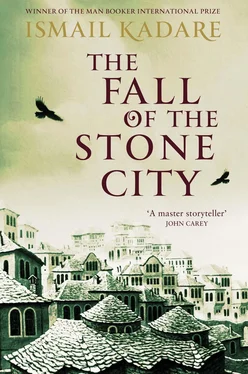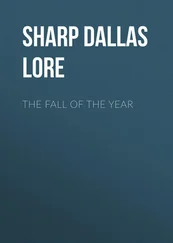That is how they had seen her leaving the village of Kardhiq, where for three days and nights they had stripped her of her humanity, and that is how she looked as they watched her coming to Tepelene. Those who had heard her story from others, who themselves had it from hearsay, had imagined her looking like this, or even paler. A song had been composed about her, though nobody knew when or by whom. It began, “I lost my soul in the prison cell/Of Sanisha, black as hell.”
As she walked, her brother Ali Tepelene watched her from his great house through a long officer’s telescope. His face was as black with fury as hers was pale. His sister’s movements made it clear that she had come to look for death. No doubt at his hands. He did what she wanted and coldly shot her, first with a bullet in the forehead, and then with two, one in the forehead and one in the heart, and then four, fourteen, God knows how many. But this brought him no peace of mind. He killed her again, with all kinds of weapons, but still he was not satisfied, only filled with such distress that when he saw her dead, he kissed her on the brow.
Later when he heard the song, he said to himself, “Ah, why didn’t I kill her properly?”
No one know who had composed the song, and its meaning was ambiguous: it could be interpreted as a song of her ravishers, shackled in the Cave of Sanisha, in the cell which her avenging brother had later created especially for them; it might equally be taken as a song about the fatal depths of a woman’s body, below her belly, which had led them into temptation. But in both cases it was a song or lament put into the mouths of her violators. Ali Tepelene, the most powerful vezir of the Ottoman Empire, who would give orders even to the sultan, had been unable in forty years to detach the meaning of the song from its dark history.
On 17 February, shortly before midnight, Shaqo Mezini and Arian Ciu, the foremost investigators of Albania and perhaps of the entire Communist Bloc, could not rid their minds of this song; its words made their knees buckle with terror and desire as they descended the steps of the famous cave.
They led the two doctors, whom they had known since childhood, in handcuffs.
A blinding light shone from an electric torch.
Neither of the investigators knew what their voices would sound like under the stone vault. When they first spoke, the sound was even stranger than they expected.
They heard their words, not in their own voices but as if spoken by actors from the distant past, returning to them enveloped in a terrifying echo and hanging suspended in the chamber before they melted away. “For. . the. . m u r d e r. . ”
It took some time for the doctors to understand the language. They were under investigation for the murder of patients during surgical procedures. They had no way of questioning why. There were no whys and hows. They were supposed to listen carefully to the conclusion of the investigation. This was a democratic proletarian state with the highest form of justice in the world, which never punished the innocent. The doctors were now cleared of the accusation of murder. The investigators had examined the full list of their patients and the exact times of their murders, they meant their deaths, and in particular the biographies of the victims, or rather the deceased, and had concluded that the numbers of the deceased of different political allegiances, i.e. communists, royalists and nationalists, did not reveal any political bias on the part of the surgeons. The suspicions against them were totally groundless.
The doctors sighed in relief but the investigators did not look any more relaxed. “We have only one question. It is simple, but fundamental.”
After a long silence the question was finally put to the two prisoners. The investigators now knew that the doctors had not committed murder. But the question was, were they aware. .
Almost in unison the doctors exclaimed, “ What? ” And indeed the astonished Big Dr Gurameto said it in German, “ Was ?”
The investigators tried to explain. The word “aware” need not be interpreted in a literal sense. They meant a general awareness that medicine could be used to commit murder. Political murder, of course. For instance of communist leaders.
The same gasps of amazement came again, and an exclamation in German.
Never. Of course not. They were doctors. They were bound by the Hippocratic oath. Who would dare suggest something so repellent, even as a joke?
“Our interview is over,” said one of the investigators. “As you see, we have been impartial. We only wanted the truth. Guard, take the prisoners to their cells.”
Two hours later, at three in the morning, they brought the doctors back to the cave. Not only the investigators’ voices but everything else was different. The cave had become their home. In fact the investigators’ first words were, “I think you know that we are here in the Cave of Sanisha.”
The doctors nodded to show they did.
Both sides stared at each other. “Don’t think we’re taking back what we said two hours ago, that we hoodwinked you and just pretended to believe in your innocence. There’s no question of that. You’re clear of any charge of murder. We’re going to ask you about something else.”
The investigators felt that the cave had taken them into its power. A fervour and excitement that they had never felt before, in which lust and suffering were mixed, had totally mastered them. They were not just investigators, they were the ravishers of Ali Pasha Tepelene’s sister. They were both torturers and their own victims.
“Dr Gurameto, we want to ask you about the dinner on the night of 16 September 1943.”
More than anything that had been said so far, this sent a chill of terror through the doctor.
Ah, that dinner. He did not say these words aloud, but they were in his eyes, his laboured breath, the very hair on his head.
The investigators looked straight at him.
“What do you want to know?” Dr Gurameto said, but in a voice that seemed to question whether what had happened could ever be known.
“We want the truth,” the investigators said, almost in one voice. “Everything. Hour by hour and minute by minute.”
The doctor stared into vacant space.
Could this truth ever be known or put in words? So far every effort had been made to conceal it. For almost ten years, by unspoken agreement, these events had been covered by the cold ash of oblivion, forgotten by both Germans and Albanians, royalists, nationalists and communists alike. Now they wanted to wipe away this ash. They wanted the truth.
“The whole truth,” the investigators repeated. “What happened. What was said. What was not said.”
Big Dr Gurameto lowered his eyelids. The doctor began to speak, slowly and tonelessly. The square in front of the city hall with its wet asphalt and the statue of Çerçiz Topulli in the middle appeared before him with extraordinary distinctness. The tank crews had just descended to stretch their legs. The officers fussed over the mud that spattered their boots. Then, by the door of an armoured vehicle, he saw Colonel Fritz von Schwabe, the commander of the troops, with his army greatcoat slung over his shoulder. His college friend watched him with glistening eyes as he approached.
Their emotional greeting. What von Schwabe said: ‘Do you recognise me? Have I changed?’ Then his dismay at Albanian treachery, his threat to punish the city, the hostages. As threatening as anything he said was the pale glint of his Iron Cross.
Dr Gurameto asked if it was necessary to relate in detail what happened next. The investigators replied that he should tell what he thought was necessary, so he described his invitation, the colonel’s acceptance and the dinner itself. He gave an account of who was present and of the atmosphere, the music and the champagne; he did not dwell any more than necessary on the release of the hostages. After he finished describing daybreak and how everybody was exhausted after the long night without sleep, there fell a long silence that was finally broken by Shaqo Mezini with a single ominous question.
Читать дальше












